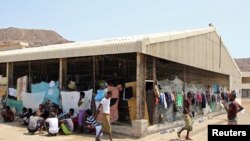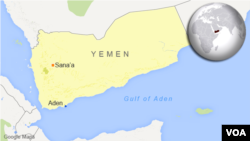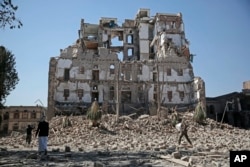Anxious and hungry, hundreds of African migrants lie cramped together on the ground of a open-air warehouse in the southern Yemeni port city of Aden.
Most are from desperately poor Horn of Africa countries and like tens of thousands each year, were willing to risk the treacherous journey through war-torn and impoverished Yemen in
the hope of finding work in Saudi Arabia and other wealthy Gulf Arab states.
But their plan was not to be. Caught and detained by the Yemeni authorities, the 600 or so men now await deportation, prevented from leaving their makeshift jail by armed soldiers.
Conditions at the warehouse are growing increasingly desperate. Several days ago, the authorities stopped handing out food and basic supplies.
"I came from Djibouti to work. They used to give us small amounts of food. If there is no food, we will die," said one migrant who declined to give his name.
"If there is no solution, they will deport us to our countries or get us out of here", the man added.
Yemen, the poorest country on the Arabian Peninsula, has long been a transit point for migrants and refugees from East Africa, many of whom are fleeing hunger and violence.
The route was unsafe long before Yemen descended into all-out war in 2015. Hundreds drown each year on the perilous sea journey, and those who make it face multiple risks, including death by "assault, extortion and abuse by criminal networks, as well as the hazards stemming from the war in Yemen itself", according to UNHCR, the United Nations' refugee agency.
Despite these dangers, the number of migrants traveling across the Gulf of Aden and Red Sea to Yemen has been rising steadily, to 117,000 in 2016 from 92,000 in 2015, according to
UNHCR.
Khaled al-Elwany, a local official who until recently oversaw the deportation of migrants back to their home countries, says up to 15,000 migrants are arrested at city checkpoints each month.
Elwany says he was fired by the interior ministry for refusing to cooperate with a plan to relocate the center to a neighboring province and after authorities stopped food supplies.
A ministry official told Reuters that the aim of the move to a new facility had been to improve conditions for the migrants while they await deportation.
Saudi Arabia and a coalition of mostly Gulf Arab allies are fighting to restore Yemen's exiled government to power and roll back the Iran-aligned Houthi movement.
While the government nominally controls Aden and other southern areas, a budget crunch and rivalries with local armed groups mean its officials mostly reside abroad.
State services and salaries have been hit hard by the chaos, and the African migrants appear to be a lower priority.
The frightened men in the Aden warehouse, subsisting on bread bought with meager savings and washing their clothes in an rubbish-strewn outdoor space, are just the tip of the iceberg.







